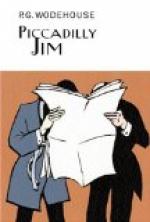Ann turned her head to address an imaginary companion.
“You must listen to this, my dear,” she said in an undertone. “He speaks wonderfully! They used to call him the Boy Orator in his home-town. Sometimes that, and sometimes Eloquent Algernon!”
Jimmy eyed her fixedly. He disapproved of this frivolity.
“One of these days you will try me too high—!”
“Oh, you didn’t hear what I was saying to my friend, did you?” she said in concern. “But I meant it, every word. I love to hear you talk. You have such feeling!”
Jimmy attuned himself to the key of the conversation.
“Have you no sentiment in you?” he demanded.
“I was just warming up, too! In another minute you would have heard something worth while. You’ve damped me now. Let’s talk about my lifework again.”
“Have you thought of anything?”
“I’d like to be one of those fellows who sit in offices, and sign checks, and tell the office-boy to tell Mr. Rockerfeller they can give him five minutes. But of course I should need a check-book, and I haven’t got one. Oh well, I shall find something to do all right. Now tell me something about yourself. Let’s drop the future for awhile.”
* * * * *
An hour later Jimmy turned into Broadway. He walked pensively, for he had much to occupy his mind. How strange that the Petts should have come over to England to try to induce him to return to New York, and how galling that, now that he was in New York, this avenue to a prosperous future was closed by the fact that something which he had done five years ago—that he could remember nothing about it was quite maddening—had caused Ann to nurse this abiding hatred of him. He began to dream tenderly of Ann, bumping from pedestrian to pedestrian in a gentle trance.
From this trance the seventh pedestrian aroused him by uttering his name, the name which circumstances had compelled him to abandon.
“Jimmy Crocker!”
Surprise brought Jimmy back from his dreams to the hard world —surprise and a certain exasperation. It was ridiculous to be incognito in a city which he had not visited in five years and to be instantly recognised in this way by every second man he met. He looked sourly at the man. The other was a sturdy, square-shouldered, battered young man, who wore on his homely face a grin of recognition and regard. Jimmy was not particularly good at remembering faces, but this person’s was of a kind which the poorest memory might have recalled. It was, as the advertisements say, distinctively individual. The broken nose, the exiguous forehead, and the enlarged ears all clamoured for recognition. The last time Jimmy had seen Jerry Mitchell had been two years before at the National Sporting Club in London, and, placing him at once, he braced himself, as a short while ago he had braced himself to confound immaculate Reggie.




